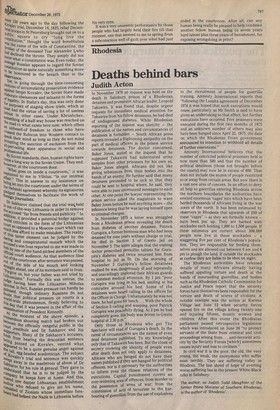Rhodesia
Deaths behind bars
Judith Acton
In November 1970 an inquest was held on the death in Salisbury prison of a Rhodesian, detainee and prominent African leader, Leopold Takawira. It was found that, despite urgent requests for immediate medical attention for Takawira from his fellow detainees, he had died of undiagnosed diabetes. While Rhodesian reporting of the inquest was sketchy the publication of the names and circumstances of detainees is forbidden South African press reports revealed a frightening antipathy on the part of medical officers in the prison service towards detainees. The doctor concerned, Baker Jones, stated at the inquest that he supposed Takawira had substituted urine samples from other prisoners for his own as, Baker Jones alleged, Africans did not like giving substances from their bodies into the hands of an enemy. He further said that many detainees pretended to be sick so that they could be sent to hospital where, he said, they were able to pass uncensored messages to each other. At one point the lawyer representing the prison service asked the magistrate to warn Baker Jones before he said anything more -.the inference being that he was laying himself open to criminal charges.
In November 1975 a letter was smuggled
from a Rhodesian prison revealing the death from diabetes of another detainee, Patrick Gurupira, a former business man who had been detained for nine years without charge or trial. He died in Section 5 of Gwelo jail on November 5. The letter alleges that the visiting doctor prescribed penicillin tablets for Gurupira's diabetes and twice returned him from hospital to jail as fit. On the morning of November 5 GuruPira's fellow detainees realised he was dangerously ill and repeatedly and unavailingly implored their African guards to summon medical attention. By 1 pm "poor Gurupira was lying in his bed, smiling at his comrades around his bed. Some of the detainees were heard calling to the offices for the Officer in Charge. Unfortunately he was not there, he had gone for lunch .. . With the whole. of Section 5 calling and weeping, poor Patrick Gurupira was peacefUlly dying. At 2 pm he had completely gone. His body was driven to Gwelo hospital at 2.30 p.m."
Only those in Rhodesia who get The Spectator will read of Gurupira's death. In the rarest of circumstances are the names of even dead detainees published. To my knowledge only that of Takawira has been. But the cloak of secrecy covering the identity of people even after death does not only apply to detainees. Africans who are hanged clb not have their names published if they are hanged for political offences, nor is it necessary for the authorities to inform even the closest relatives of the executions. Capital punishment covers an ever-widening area of offences; from murder to the possession f arms of war; from the o commission of acts of terrorism to the harbouring of guerrillas; from the use of explosives. to the recruitment of people for guerrilla training. Amnesty International reports that "following the Lusaka agreement of December 1974 it was hoped that such executions would cease, particularly as Mr Smith is said to have given an undertaking to that effect, but further executions have occurred. Five prisoners were executed during the first two months of 1975 and an unknown number of others may also have been hanged since April 22, 1975, the date on which the Rhodesian Front government announced its intention to withhold all details of further executions."
Amnesty International believes that the number of convicted political prisoners held is now more than 500 and that the number of political detainees (those not brought before the courts) may now be in excess of 600. That does not include the scores of people restricted to or away from certain areas. But now there is a vast new area of concern. In an effort to deny all help to guerrillas entering Rhodesia across the northern boundaries the authorities have erected enormous 'cages' into which have been herded thousands of Africans living in the war zones of the north. It has been estimated by
.observers in Rhodesia that upwards of 250 of these "cages" as they are formally known
have been put up. They are barbed wire stockades each holding 1,000 to 1,500 people. If these estimates are correct about 300,000
'people now, live in these stockades a
staggering five per cent of Rhodesia's population. They are responsible for feeding them selves and are allowed out between 6 am and 6 pm to plough the land. If outside the stockades at curfew they are liable to be shot on sight.
The Rhodesian authorities have released details of many Africans already having suffered appalling torture and death at the hands of maurauding guerrillas, and bodies such as the Rhodesian Catholic Commission for Justice and Peace report that the security forces have themselves been responsible for the torture and death of scores of civilians. .A notable example was the action at Karima Village last June 12 when security forces opened fire on the village killing twenty-one and injuring fifteen, mostly women and children. After this event the Rhodesian parliament passed retrospective legislation which was introduced on June 24 "to protect servants of the State from criminal and civil proceedings arising from ... anti-terrorist activity by the Security Forces [which] sometimes causes injury and loss to civilians."
In civil war it is the poor, the old, the very young, the weak, the anonymous who suffer most terribly. They are suffering today in Rhodesia. The last shred of hope of averting • worse suffering lies in the present White-Black talks in Salisbury.
The author, as Judith Todd (daughter of the former Prime Minister of Southern Rhodesia), is the author of 'Rhodesia'.


































 Previous page
Previous page